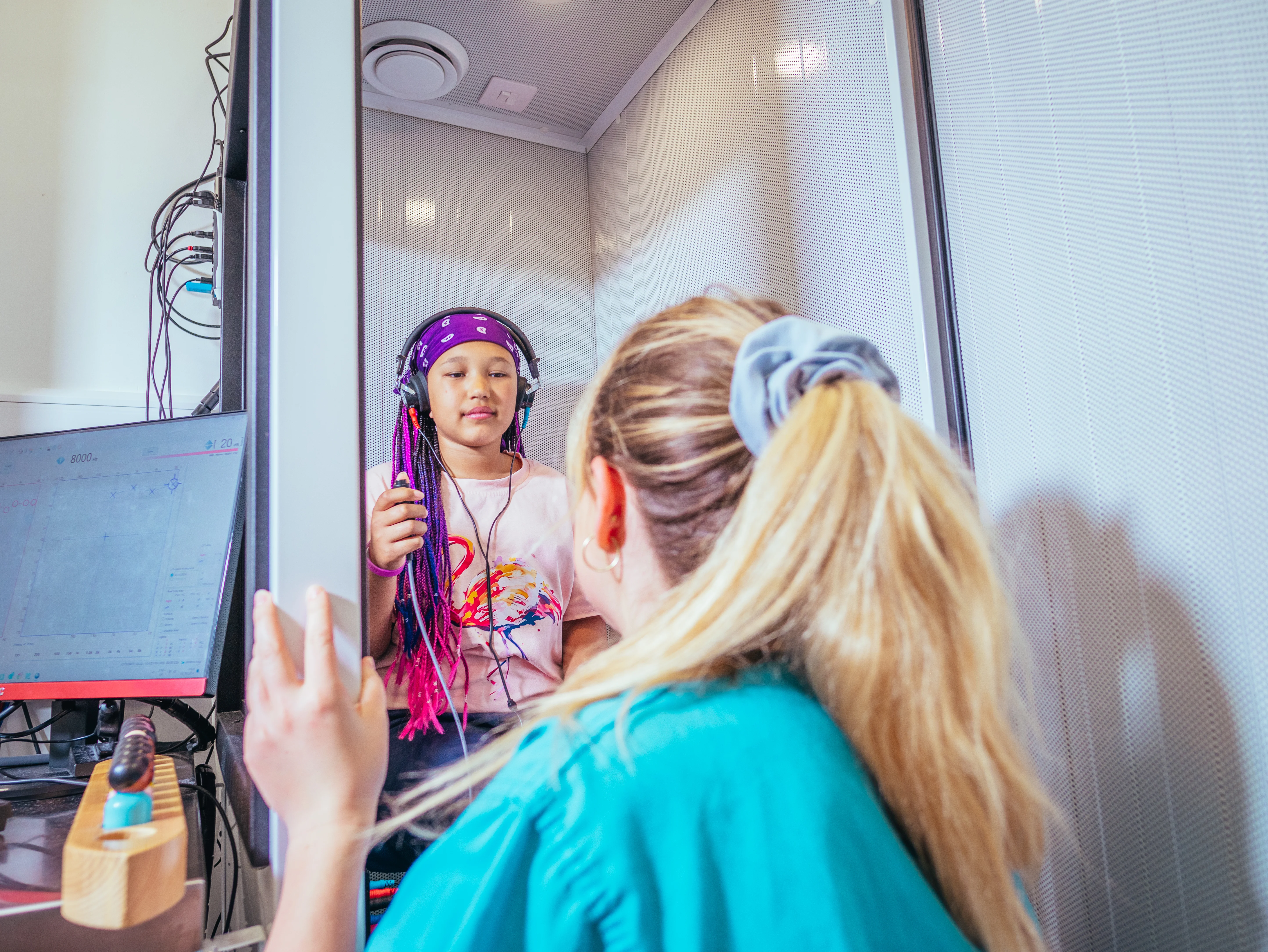Hearing Tests For Children
Do you have an inkling your child is struggling to hear? Let us help.
If you suspect your child may have a hearing problem, the sooner you have their hearing tested, the better. Detecting a hearing problem in a child can be challenging, especially in younger children who may not be able to express themselves clearly.
Hearing tests for children and adults share some similarities, but testing methods and considerations differ due to the unique aspects of paediatric audiology, and Byrom Audiology is one of very few listening centres that provide audiologists trained in paediatrics.

How we adapt hearing assessments for children
They say never work with children or animals - us paediatric audiologists need to be as adaptable and flexible as TV presenters! The trick is in adjusting testing methods to your child's age, developmental stage, and ability to cooperate during the assessment, which is why well-known high street hearing centres don’t provide children’s hearing tests.
The Byrom Audiology team is trained to use age-appropriate and child-friendly methods to obtain accurate information about your child's hearing abilities.
Here’s what you can expect:
Following a chat with you about your child’s medical history, pain or symptoms you believe they have, and your concerns related to their hearing or speech development.
We’ll run a Tympanometry test plus at least one other from the following list, appropriate to your child’s age – and level of cooperation on the day!
-
Play Audiometry
A very effective game, we ask your child to put little wooden people into a boat when they hear the sounds we play to them through ear phones. It is simpler, easier, quicker, and more fun for everyone concerned – we mean, for your child!
-
Otoacoustic Emissions (OAE) Test
This ‘screener’ test measures the sounds produced by the inner ear in response to a stimulus, which we use with uncooperative children or those under 3 years of age.
-
Tympanometry test
This test measures the movement of the eardrum in response to changes in air pressure which assesses the health of the middle ear and the mobility of the eardrum. Tympanometry is an important test for children as they often suffer from glue ear and other middle ear problems.
-
Pure Tone Audiometry (PTA)
We use full Pure Tone Audiometry only on children above 7 or 8 years old although it can also depend on the child's maturity levels. We play a series of tones tailored to children at different frequencies and volumes through headphones and ask them to tell us what/ when they hear.
-
Ear Wax Removal
Ear Wax can be surprisingly debilitating, and we can remove a build-up of wax on accommodating and collaborative children who are able to sit still!
Based on the outcome of the tests, we can prescribe the right treatment or hearing aids, or we can refer your child straight to the ENT (Ears, Nose & Throat specialist) in your local area or a private clinic.
Our ultimate goal is to identify any hearing issues your child may have early on, allowing for timely intervention and support to ensure proper language and communication development. We usually run at least two tests, to get a thorough understanding of your child’s hearing nerve and the middle ear, which costs £185 and takes around 90mins.
Call now on 0114 419 1800 or click here to book an appointment online
Peter or Nicole will conduct the hearing assessment to determine if there is any hearing impairment and recommend appropriate interventions if necessary.
Some signs you may have noticed that could indicate a hearing problem in your child.
-
Delayed speech and language development
You may be concerned if your child is not reaching typical speech and language milestones, or their vocabulary is limited compared to their peers. Perhaps they have speech or mispronunciation difficulties.
-
Inconsistent response to sounds
A child with normal hearing typically responds to sounds by turning their head and looking towards the source of the sound or reacting in some way. If your child consistently fails to respond to sounds, it may indicate a hearing problem.
-
Difficulty following directions
Children with hearing problems may have difficulty understanding and following spoken instructions.
-
Volume control
A child with hearing issues might speak loudly or have difficulty controlling the volume of their voice.
-
Frequent ear infections
Repeated ear infections can lead to temporary hearing loss, so if your child has a history of ear infections, it's essential to monitor their hearing.
-
Unusual behaviour during conversations
A child with hearing problems may exhibit unusual behaviours or reactions during conversations, such as leaning in closely, asking people to repeat themselves frequently, or watching people's faces intently.
-
Unusual behaviour in the classroom
Your child may appear disruptive during class, which could possibly be due to them being unable to hear properly, and so feeling excluded.
-
Social withdrawal
Hearing problems can lead to social isolation if your child has difficulty communicating or understanding others, so the sooner their hearing is tested, the sooner we can help treat them.
Of course, children develop at different rates, but if you suspect your child may have a hearing problem, book an appointment with Peter or Nicole for peace of mind.
Call now on 0114 419 1800 or click here to book an appointment online
Services
Our Clinics
-
Byrom Audiology
Thornbury Hospital
312 Fulwood Road
Sheffield S10 3BR -
Byrom Audiology
12 Causeway Head Road Dore
Sheffield S17 3DT
0114 419 1800 - support-team@peterbyrom.co.uk


